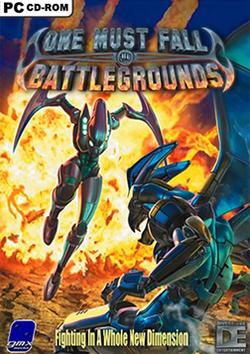| One Must Fall: Battlegrounds | |
|---|---|
 | |
| Developer(s) | Diversions Entertainment |
| Publisher(s) | Diversions Publishing Tri Synergy GMX Media Manaccom |
| Platform(s) | Microsoft Windows |
| Release | |
| Genre(s) | Fighting |
| Mode(s) | Single-player, multiplayer |
One Must Fall: Battlegrounds is a fighting game for Microsoft Windows. Developed by American studio Diversions Entertainment and co-published in December 2003 by Diversions Publishing and Trisynergy Inc. following nearly 7 years of development, One Must Fall: Battlegrounds brought the One Must Fall series into a second installment released in an age where the gaming world expected graphics and gameplay in three dimensions with internet gameplay as an integral portion of the offering.